As K-pop continues to expand its influence throughout Taiwan, new Korean restaurants are opening every month, many with their own culinary niche. Strongly influenced by South Korea’s hit TV series My Love from the Star, whose main protagonist lives on a steady diet of fried chicken and beer, Ovenmaru Chicken, which opened in December of last year, has become popular for its great food, service and atmosphere.
Located behind the old Sogo Department Store, the restaurant is a five-minute walk from MRT Zhongxiao Fuxing Station (忠孝復興站). Ovenmaru’s drop lights, wood tables and cultured stone walls create a cafe-like atmosphere, and the big screen TV constantly playing Korean music videos and dramas help to round out the K-pop vibe.
Overmaru has more than 70 outlets in Seoul. The Korean word “maru” means “top,” which refers to its top-quality food. Its first outlet in Taipei is operated by two South Koreans. General manager Branden Lee attributes part of the restaurant’s popularity to its oven-baked chicken, which he says is healthier than the deep-fried variety. On average, the former contains 130 calories while the latter contains 269 calories per 250g serving. With oven baking, the chicken remains crispy on the outside and moist on the inside, without being greasy.
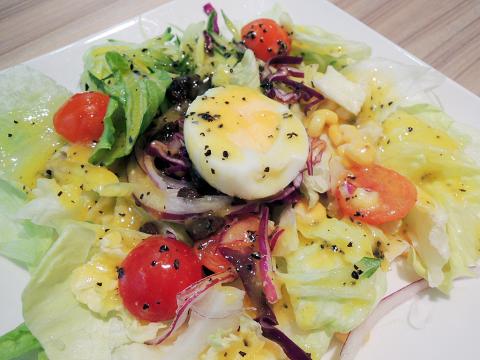
Photo: Eddy Chang, Taipei Times
Ovenmaru offers four varieties (NT$359 to NT$399) of oven-baked chicken, two of which are covered in a blanket of brown rice before baking. Each order includes pickled vegetables.
We first tried the oven-baked chicken (原味烤頂雞, NT$379). Although they were not deep fried, the golden chunks of chicken were crispy, and the brown rice provided a unique crunchy texture. Having been marinaded for two days, the chicken had a pleasant aroma similar to five-spice powder.
You can’t go wrong with Ovenmaru’s specialty, the dry-fried crispy chicken (乾烹脆皮烤雞, NT$389). A cooking method that originated in China’s Shandong Province, the dish is also beloved in Taiwan and South Korea. Cooked with a spicy sauce and green onions until caramelized, it was slightly sweeter than regular dry-fried chicken.
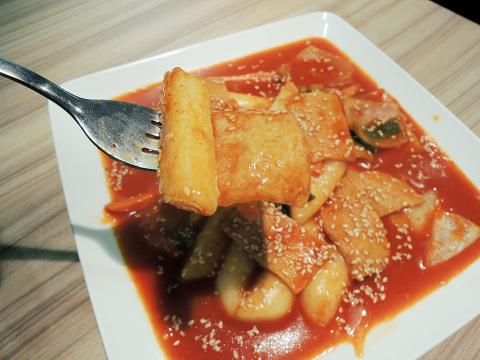
Photo: Eddy Chang, Taipei Times
The oven-baked boneless chicken with a sweet and sour mayonnaise-like topping (無骨奶油白醬烤頂雞, NT$399) came garnished with shredded lettuce and flakes of dried parsley. This oven-baked version was less robust than the other two varieties, but it didn’t suffer in taste, and the combination of the sweet and sour rounded out the three nicely.
The mixed salad (沙拉, NT$99) and stir-fried Korean spicy rice cake (辣炒年糕, NT$149) are also recommended. The shredded cabbage, onions, apples, cucumbers, corn, tomatoes, raisins and boiled egg were finely mixed in harmony, and the dressing made of passion fruit was quite refreshing. The cylinder-shaped white rice cake was cooked in red chili paste and served with tempura, carrots, onions and green onions. It was softer than the chewy rice cake I’ve had at other restaurants.
The restaurant offers over two dozen alcoholic and non-alcoholic drinks from South Korea, and there is a discount of NT$30 for beer if you order a chicken dish. Each of us paid about NT$400 for a great dinner. Overall, Ovenmaru Chicken was an enjoyable dining experience, and you should give it a try.
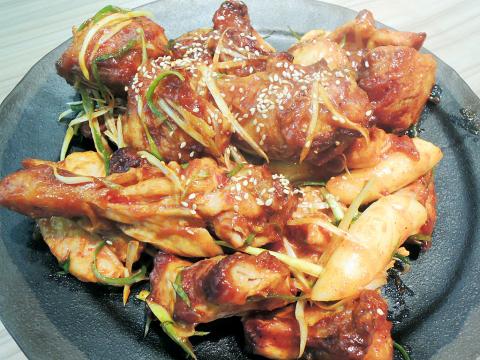
Photo: Eddy Chang, Taipei Times
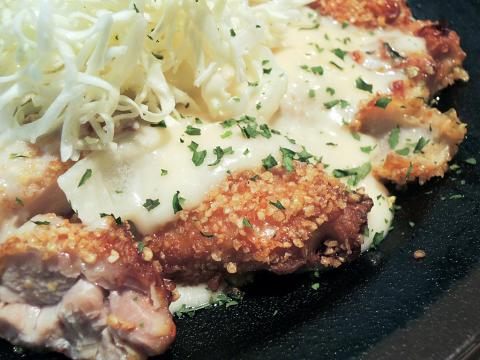
Photo: Eddy Chang, Taipei Times
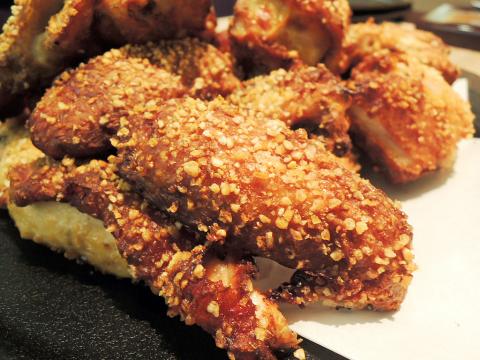
Photo: Eddy Chang, Taipei Times

June 23 to June 29 After capturing the walled city of Hsinchu on June 22, 1895, the Japanese hoped to quickly push south and seize control of Taiwan’s entire west coast — but their advance was stalled for more than a month. Not only did local Hakka fighters continue to cause them headaches, resistance forces even attempted to retake the city three times. “We had planned to occupy Anping (Tainan) and Takao (Kaohsiung) as soon as possible, but ever since we took Hsinchu, nearby bandits proclaiming to be ‘righteous people’ (義民) have been destroying train tracks and electrical cables, and gathering in villages

Dr. Y. Tony Yang, Associate Dean of Health Policy and Population Science at George Washington University, argued last week in a piece for the Taipei Times about former president Ma Ying-jeou (馬英九) leading a student delegation to the People’s Republic of China (PRC) that, “The real question is not whether Ma’s visit helps or hurts Taiwan — it is why Taiwan lacks a sophisticated, multi-track approach to one of the most complex geopolitical relationships in the world” (“Ma’s Visit, DPP’s Blind Spot,” June 18, page 8). Yang contends that the Democratic Progressive Party (DPP) has a blind spot: “By treating any

This year will go down in the history books. Taiwan faces enormous turmoil and uncertainty in the coming months. Which political parties are in a good position to handle big changes? All of the main parties are beset with challenges. Taking stock, this column examined the Taiwan People’s Party (TPP) (“Huang Kuo-chang’s choking the life out of the TPP,” May 28, page 12), the Democratic Progressive Party (DPP) (“Challenges amid choppy waters for the DPP,” June 14, page 12) and the Chinese Nationalist Party (KMT) (“KMT struggles to seize opportunities as ‘interesting times’ loom,” June 20, page 11). Times like these can

Swooping low over the banks of a Nile River tributary, an aid flight run by retired American military officers released a stream of food-stuffed sacks over a town emptied by fighting in South Sudan, a country wracked by conflict. Last week’s air drop was the latest in a controversial development — private contracting firms led by former US intelligence officers and military veterans delivering aid to some of the world’s deadliest conflict zones, in operations organized with governments that are combatants in the conflicts. The moves are roiling the global aid community, which warns of a more militarized, politicized and profit-seeking trend